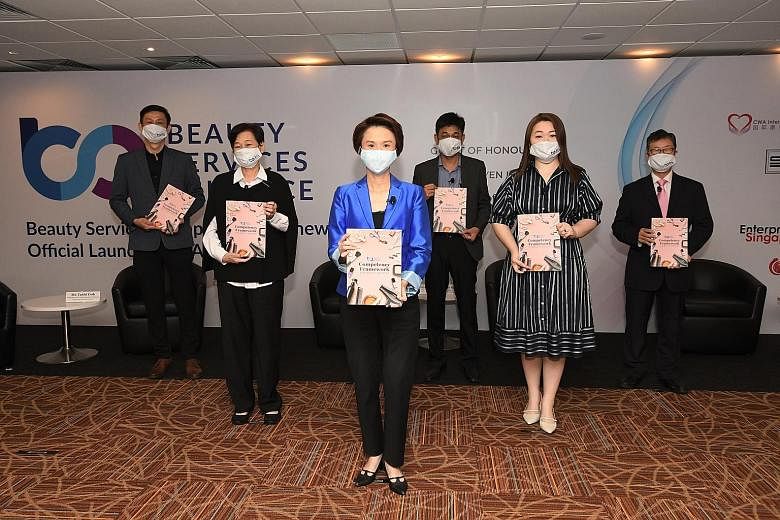Singapore's beauty industry is getting a skills facelift with the launch of a new framework to help more than 13,000 workers in the industry to plan their career and development pathways.
Speaking at the launch of the Beauty Services Competency Framework yesterday, Minister of State for Trade and Industry Low Yen Ling said it will serve as a single point of reference for businesses and employees to strengthen training capabilities in a sector that has "incredible growth potential".
Noting that the beauty services industry is growing at a rate of 10 per cent year on year, she said that there remains a strong local demand for beauty and wellness services here even as Covid-19 has led to many challenges.
Ms Low said: "People still want to look good and feel great. In fact, given the current travel restrictions, more people are having to look for spa and beauty services locally. There is also a good level of customer confidence and assurance in our own local establishments... (that they) will put in place safe management measures."
She added: "With strength in consumer demand, there is potential for new job opportunities."
Under the framework, career progression pathways are clearly mapped out, covering 45 job roles across five tracks. For example, an apprentice in the nail services industry could move up the ranks to become a manicurist, a nail artist and even earn a management role.
Those working in the industry can therefore look to it for how they can upskill to stay relevant, while interested new entrants can use the information to gain a better understanding of the sector and the specific skills required of various roles.
Business owners can also use the framework to guide decision-making in recruitment and talent management, among other things.
Ms Low mentioned the example of Ms Jamie Lai, a senior barber and trainer at Sultans Of Shave, a chain of men's grooming salons.
Using the framework, Ms Lai identified coaching skills as an area of improvement, and went on to complete a course at the Institute of Technical Education (ITE) to become a certified barber trainer.
As her company is also applying to be an approved training centre within the institute, she hopes to be a coach to not just new barbers where she works, but also ITE students.
The framework was unveiled by the Beauty Services Alliance, which brings together five trade associations in the industry. The alliance represents the interests of about 6,000 businesses, and aims to create initiatives to drive the beauty services industry's growth.
Its spokesman Simon Lee said he hopes the framework will encourage more Singaporeans to join the sector as they develop a clearer understanding of the industry and the possible career paths.
He expects that there will be at least 2,000 to 3,000 more positions for locals over the next five years. About 40 per cent of the workers in the industry now are locals. The rest are from neighbouring countries.
Alliance representative Rachel Tang said the framework will hopefully rid some of the "misconceptions" about the industry. "Beauty therapists and other professionals in the beauty services industry have... not had a very good image, which we're trying to change with this framework. (It) brings professionalism and status to what we do. We're not just providing the (basic) service, we're also able to give consultations and more professional skills."
The alliance will also work with various government agencies to advance the beauty industry, such as by establishing an accreditation system for training providers and an evaluation system for those who wish to learn the tricks of the trade.


